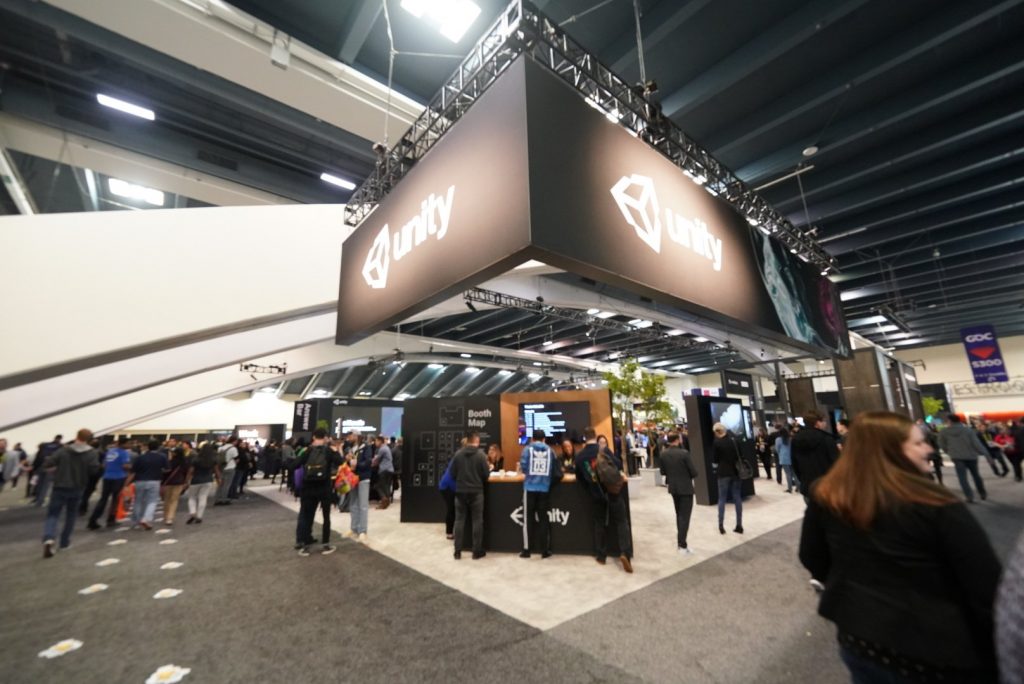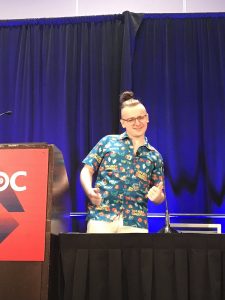The Game Developers Conference (GDC) is the world’s largest event for games in just about every medium. The five-day event kicked off last Monday in San Francisco, California, and lasted for the whole week.
Console-based video games have more or less taken over the GDC. However, there’s still space for board games at the conferences. MR, AR, and VR technology are also a driving force in games these days. As a result, many events at this year’s GDC featured VR technology. There were even two schedule tracks available called “VRDC.”
GDC is not an event that exclusively showcases VR technology. However, it is largely funded by industry partners that are heavily involved in MR, AR, and VR. These include Oculus, Unreal Engine, and Unity.
Oculus at GDC

The company announced their GDC presence via a blog post (it also mentions some other events to keep an eye on this spring).
Many of the Oculus GDC events were previews and try-outs of the upcoming Oculus Quest. The stand-alone VR headset should launch sometime later this year. Another presentation involved the ground-breaking work that Oculus had done, involving motion controls with six degrees of freedom.
Other events focused on Oculus corporate culture, producing games, and the potential social impact of VR technology and experiences.
Unreal at GDC
For the last couple of years, Epic Games has been staging its “State of Unreal” address at GDC. This tradition continued this year, among other lectures and demos.
Other Unreal events at GDC included conferences on graphics and physics designing and coding. Of course, GDC was also an opportunity for gamers to try out some new and upcoming Unreal titles.
There was also a special summit for educators to learn the benefits of using Unreal in education.
Unity at GDC

Unity devoted a whole webpage to their events at GDC. The entire second day of GDC saw Unity talks for developers, designers, and artists who use Unity in their work.
On the first day of the conference, toolsmiths from Unity, Microsoft, and Magic Leap discussed challenges and opportunities of MR. The discussion, titled “Evolving Reality: Designing on the Real World”, featured Jono Forbes, a Software Engineer at Unity.
Immediately following that session was another event, “Mental Models and Systems for Spatial Computing.” This discussion, featuring Unity Director of XR Research, Timoni West, focused on the difficulties of developing spatially aware applications. This lecture is also one of the featured VRDC sessions.
Unity also hosted a number of events on corporate culture and technical development. There was also a breakfast for educators interested in using Unity programs in their teaching.
Members of Unity also gave the keynote address. The address streamed live on Youtube and Twitch but a recorded version is also online.
The Unity Keynote
Speakers used the keynote to demo new titles and talk about software that will be available later this year. If you’re interested in game design in general, the whole show is worth a view. Fans of AR and VR technology should perk up (or skip to) around the 1 hour and 15 minute mark. Senior Technical Product Marketing Manager for AR and VR, Britney Edmund, and AR/VR evangelist, Dan Miller, took the stage. They spent their time talking about Unity’s Lightweight Render Pipeline for AR and VR projects. Unity developed the technology for making applications that could run on mobile phones, and that includes AR and VR.
“People are getting used to the idea of using their phones for more. From using them to take pictures with dinosaurs at the park to visualizing what furniture could look like in their homes before they purchase it, we’re really just starting to scratch the surface of the potential of this technology,” said Edmond. “We built a foundation specifically for AR creators that gives you the ability to build your application once and deploy it across both ARKit and ARCore enabled devices.”
The software works by taking objects rendered in HD and converting them to lighter graphics packages. This allows the applications to work on Android and Apple phones. It also allows developers to use models that they already have for other applications. Unity also includes a collection of models available for editing and use.
The complete tool connects mobile devices to the Unity Editor. This allows developers to create in real time and see how it will look on the target device.
The full release will come out in Unity Update 2019.2.
Other VR Events at GDC
As mentioned above, some events specifically focusing on VR technology were featured as VRDC events. “Mental Models and Systems for Spatial Computing” is one of these events.

Chris Wade, a designer for Owlchemy Labs, gave the talk “Embracing Chaos: Designing for Emergent Gameplay in VR”. Most of us know Owlchemy Labs “Job Simulator” but the talk discussed other popular VR technology and applications as well.
Joshua McVeigh-Schultz, postdoctoral researcher at UCSC, gave another talk, “Shaping Culture in Social VR: Lessons from the Wild.” The day-one talk focused on designing lessons for social applications and using VR technology for education and outreach.
Another talk by Ralph Barbagallo of FLARB LLC focused on AR in mobile applications. The talk, titled “Facebook and Snapchat AR: Beyond Lenses and Effects”, also took place on the first day of the event.
No matter your interest, there’s lots of exciting news for VR technology and beyond coming out of this year’s GDC.




